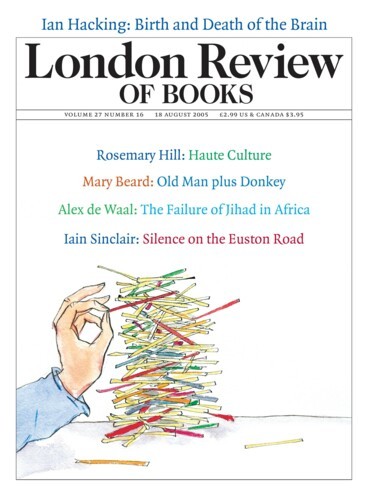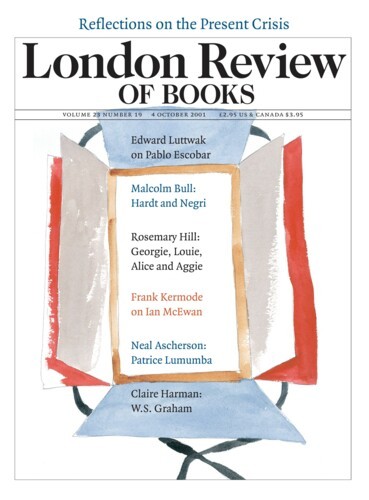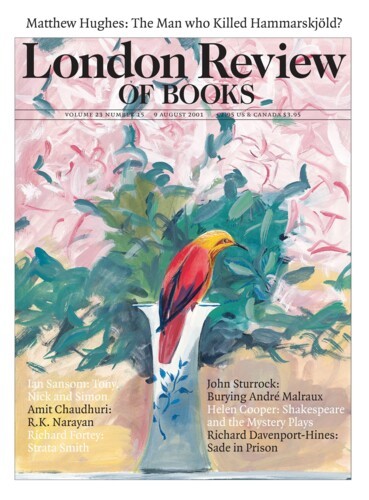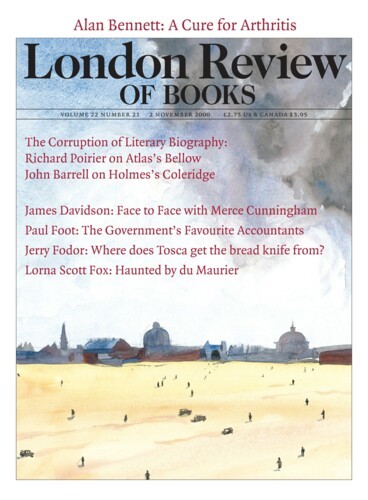Richard Davenport-Hines
Richard Davenport-Hines has written the entries on Jack the Ripper and other serial killers for the New Dictionary of National Biography. The Pursuit of Oblivion: A Global History of Narcotics 1500-2000 was published in 2001.
Horrid Mutilation! Read all about it! Jack the Ripper and the London Press by Perry Curtis
Richard Davenport-Hines, 4 April 2002
When Tennyson and Jowett sat up late together, it was to talk of murders. The Victorians took a ghoulish pleasure in every phase of their more ghastly homicides; from the moment a corpse was found the hunt for morbid thrills was intense. After seven members of the Marshall family were hacked to death at Denham in 1870, ‘pleasure vans’ brought hordes of day-trippers from London to...
11 September
4 October 2001
Doing Some Measuring ahead of Time: Sade in Prison
Richard Davenport-Hines, 9 August 2001
‘I learned to ski in prison,’ Gregory Corso wrote, having discovered that there’s nothing much for prisoners to do except imagine, fantasise and, what often follows, masturbate. Although the chief interest in Sade’s Letters from Prison lies in tracing the stimulus incarceration gave to his literary imagination, one should honour in passing his phenomenal achievements...
Spliffing: drugs
Richard Davenport-Hines, 2 November 2000
‘Marijuana has no therapeutic value, and its use is therefore always an abuse and a vice,’ trumpeted Harry Anslinger, the implacable Commissioner of the US Bureau of Narcotics in 1953:
While opium can be a blessing or a curse, depending on its use, marijuana is only and always a scourge which undermines its victims and degrades them mentally, morally and physically...
Pieces about Richard Davenport-Hines in the LRB
Take a bullet for the team: The Profumo Affair
David Runciman, 21 February 2013
Britain in the early 1960s was a divided country, torn by conflicting impulses, towards the past and the future, tradition and experimentation, dignity and fun.
Why name a ship after a defeated race? New Lives of the ‘Titanic’
Thomas Laqueur, 24 January 2013
Even before the ship sank the century of progress was pregnant with the Titanic’s fate.
Allergic to Depths: gothic
Terry Eagleton, 18 March 1999
All over the world, postgraduate students of English who might once have written on Wordsworth or Mrs Gaskell are now turning out theses on vampires, monsters, sado-masochism and mutilation. Most...
Concierge
John Lanchester, 16 November 1995
Pound died in 1972; Auden, who was 22 years younger, in 1973. Both writers underwent the usual posthumous dip in attention and reputation. This familar dégringolade is a mysterious process, and...
Baring his teeth
Peter Clarke, 25 June 1992
On 10 January 1957 the momentous news reached the family publishing house in St Martin’s Lane. ‘Mr Macmillan has just been made prime minister,’ his elder brother Daniel was...
Read anywhere with the London Review of Books app, available now from the App Store for Apple devices, Google Play for Android devices and Amazon for your Kindle Fire.
Sign up to our newsletter
For highlights from the latest issue, our archive and the blog, as well as news, events and exclusive promotions.





